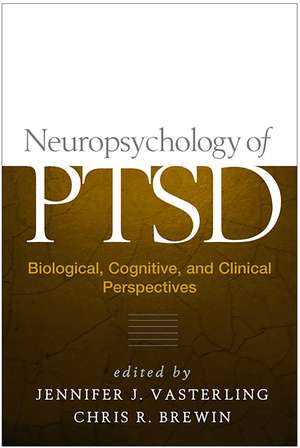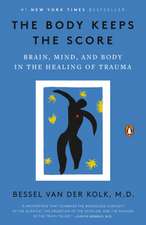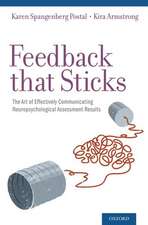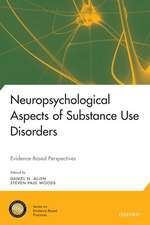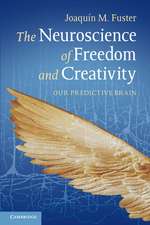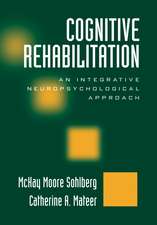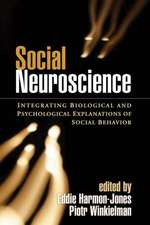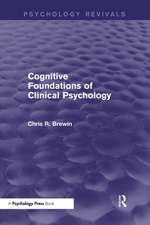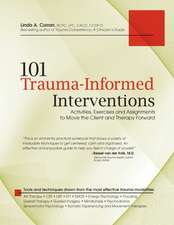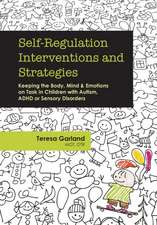Neuropsychology of PTSD: Biological, Cognitive, and Clinical Perspectives
Editat de Jennifer J. Vasterling, Chris R. Brewinen Limba Engleză Hardback – 30 iun 2005
Comprehensively examining the effects of psychological trauma on the brain, this volume integrates neurobiological, clinical, and cognitive aspects of PTSD. Presented is groundbreaking research on the emergence of neuropsychological dysfunctions in specific trauma populations: children, adults, older adults, and victims of closed head injury. Coverage encompasses a range of chronic problems with memory, attention, and information processing that are related to trauma exposure. Linking neuropsychological findings to the realities of clinical practice, the concluding section addresses key implications for PTSD assessment and for pharmacological and psychological treatment.
Preț: 493.48 lei
Nou
Puncte Express: 740
Preț estimativ în valută:
94.44€ • 98.23$ • 77.97£
94.44€ • 98.23$ • 77.97£
Carte tipărită la comandă
Livrare economică 14-28 aprilie
Preluare comenzi: 021 569.72.76
Specificații
ISBN-13: 9781593851736
ISBN-10: 1593851731
Pagini: 337
Dimensiuni: 152 x 229 x 24 mm
Greutate: 0.6 kg
Ediția:1
Editura: Guilford Publications
Colecția Guilford Press
ISBN-10: 1593851731
Pagini: 337
Dimensiuni: 152 x 229 x 24 mm
Greutate: 0.6 kg
Ediția:1
Editura: Guilford Publications
Colecția Guilford Press
Public țintă
Postgraduate, Professional, Professional Practice & Development, and UndergraduateCuprins
Preface
I. Background and Context
1. Epidemiological and Methodological Issues in Neuropsychological Research on PTSD, Lisa M. Duke and Jennifer J. Vasterling
II. Biological Perspectives
2. Neurobiological and Neurocognitive Alterations in PTSD: A Focus on Norepinephrine, Serotonin, and the Hypothalamic-Pituitary-Adrenal Axis, Steven M. Southwick, Ann Rasmusson, Jill Barron, and Amy Arnsten
3. Structural and Functional Anatomy of PTSD: Findings from Neuroimaging Research, Lisa M. Shin, Scott L. Rauch, and Roger K. Pitman
4. Electrophysiology of PTSD, Linda J. Metzger, Mark W. Gilbertson, and Scott P. Orr
III. Cognitive and Information-Processing Perspectives
5. Information-Processing Biases in PTSD, Joseph I. Constans
6. Encoding and Retrieval of Traumatic Memories, Chris R. Brewin
IV. Developmental and Population-Specific Perspectives
7. Early Trauma Exposure and the Brain, Michael D. De Bellis, Stephen R. Hooper, and Jennifer L. Sapia
8. Neuropsychological Findings in Adults with PTSD, Jennifer J. Vasterling and Kevin Brailey
9. Learning and Memory in Aging Trauma Survivors with PTSD, Rachel Yehuda, Karina Stavitsky, Lisa Tischler, Julia A. Golier, and Philip D. Harvey
10. PTSD and Traumatic Brain Injury, Allison G. Harvey, Michael D. Kopelman, and Chris R. Brewin
V. Clinical Applications
11. Clinical Neuropsychological Evaluation, Jennifer J. Vasterling and Jennifer S. Kleiner
12. Implications for Psychological Intervention, Chris R. Brewin
13. Pharmacological Approaches to Cognitive Deficits Associated with PTSD, Matthew J. Friedman
I. Background and Context
1. Epidemiological and Methodological Issues in Neuropsychological Research on PTSD, Lisa M. Duke and Jennifer J. Vasterling
II. Biological Perspectives
2. Neurobiological and Neurocognitive Alterations in PTSD: A Focus on Norepinephrine, Serotonin, and the Hypothalamic-Pituitary-Adrenal Axis, Steven M. Southwick, Ann Rasmusson, Jill Barron, and Amy Arnsten
3. Structural and Functional Anatomy of PTSD: Findings from Neuroimaging Research, Lisa M. Shin, Scott L. Rauch, and Roger K. Pitman
4. Electrophysiology of PTSD, Linda J. Metzger, Mark W. Gilbertson, and Scott P. Orr
III. Cognitive and Information-Processing Perspectives
5. Information-Processing Biases in PTSD, Joseph I. Constans
6. Encoding and Retrieval of Traumatic Memories, Chris R. Brewin
IV. Developmental and Population-Specific Perspectives
7. Early Trauma Exposure and the Brain, Michael D. De Bellis, Stephen R. Hooper, and Jennifer L. Sapia
8. Neuropsychological Findings in Adults with PTSD, Jennifer J. Vasterling and Kevin Brailey
9. Learning and Memory in Aging Trauma Survivors with PTSD, Rachel Yehuda, Karina Stavitsky, Lisa Tischler, Julia A. Golier, and Philip D. Harvey
10. PTSD and Traumatic Brain Injury, Allison G. Harvey, Michael D. Kopelman, and Chris R. Brewin
V. Clinical Applications
11. Clinical Neuropsychological Evaluation, Jennifer J. Vasterling and Jennifer S. Kleiner
12. Implications for Psychological Intervention, Chris R. Brewin
13. Pharmacological Approaches to Cognitive Deficits Associated with PTSD, Matthew J. Friedman
Recenzii
This is a scholarly yet highly readable book that makes the neuropsychology of PTSD accessible to both neuropsychologists and non-neuropsychologists. Up-to-date reviews include good summaries and discussions of clinical implications. This is a 'must read' for PTSD researchers and clinicians, especially those in the VA system and trauma centers, who are faced with desperate patients every day. This is the type of work that will eventually improve our assessment and treatment of these patients.--Kathleen Y. Haaland, PhD, New Mexico VA Healthcare System and University of New Mexico School of Medicine
A powerful synthesis of the cognitive neuroscience of PTSD, this text integrates scientific and clinical findings across a wide spectrum of disciplines. These reviews will undoubtedly stimulate future discourse and scientific work, permitting an expansion of knowledge on the disabling condition of PTSD. The editors have assembled an outstanding group of experienced and thoughtful contributors to summarize the extant knowledge base and point the field in new and exciting directions.--Terence M. Keane, PhD, VA Boston Healthcare System
This volume explores how the disruption of the information processing systems of the brain is central to understanding the psychopathology of trauma-related syndromes. Its strength is that it elucidates basic neuroscience concepts that are important to understanding both the etiology and phenomenology of PTSD. Against this background there is an inviting discussion of treatment issues, which are well-linked back to the basic psychobiology. Bringing together eminent experts in the field, this book will serve as a primary reference for clinicians and researchers alike.--Alexander C. McFarlane, MD, Department of Psychiatry, University of Adelaide, Australia
Because this book addresses a cardinal and often-neglected topic, I read it with the utmost curiosity--and found it exceptionally well composed, instructive, and thought-provoking. The editors have assembled the best experts in the field, who present their work in a style that is a pleasure to read. The book masterfully covers current knowledge and views and never becomes redundant. I warmly recommend this book to clinicians, scholars, and students; indeed, to anyone who has been waiting for a fair, thoughtful, and balanced overview of this important area.--Arieh Y. Shalev, MD, Department of Psychiatry, Hadassah University Hospital, Israel
-A powerful synthesis of the cognitive neuroscience of PTSD, this text integrates scientific and clinical findings across a wide spectrum of disciplines. These reviews will undoubtedly stimulate future discourse and scientific work, permitting an expansion of knowledge on the disabling condition of PTSD. The editors have assembled an outstanding group of experienced and thoughtful contributors to summarize the extant knowledge base and point the field in new and exciting directions.--Terence M. Keane, PhD, VA Boston Healthcare System
This volume explores how the disruption of the information processing systems of the brain is central to understanding the psychopathology of trauma-related syndromes. Its strength is that it elucidates basic neuroscience concepts that are important to understanding both the etiology and phenomenology of PTSD. Against this background there is an inviting discussion of treatment issues, which are well-linked back to the basic psychobiology. Bringing together eminent experts in the field, this book will serve as a primary reference for clinicians and researchers alike.--Alexander C. McFarlane, MD, Department of Psychiatry, University of Adelaide, Australia
Because this book addresses a cardinal and often-neglected topic, I read it with the utmost curiosity--and found it exceptionally well composed, instructive, and thought-provoking. The editors have assembled the best experts in the field, who present their work in a style that is a pleasure to read. The book masterfully covers current knowledge and views and never becomes redundant. I warmly recommend this book to clinicians, scholars, and students; indeed, to anyone who has been waiting for a fair, thoughtful, and balanced overview of this important area.--Arieh Y. Shalev, MD, Department of Psychiatry, Hadassah University Hospital, Israel
This new book fills a gap in the literature on PTSD. It does so by providing a balanced view of the accumulating neuropsychological evidence in an accessible format. The combination of its presentation and content make it eminently readable.
--International Review of Psychiatry, 5/22/2005Notă biografică
Jennifer J. Vasterling, PhD, is the Associate Director for Research for the Department of Veterans Affairs South Central Mental Illness, Research, Education, and Clinical Center and is a clinical professor of psychiatry and neurology at Tulane University School of Medicine. Dr. Vasterling's research has focused on the application of neuropsychological assessment methods to the study of PTSD in military veterans and on examination of the neuropsychological outcomes of military deployment.
Chris R. Brewin, PhD, is Emeritus Professor of Clinical Psychology at University College London. His clinical specialization is in the treatment of PTSD. Dr. Brewin is the author of Posttraumatic Stress Disorder: Malady or Myth? (2003).
Chris R. Brewin, PhD, is Emeritus Professor of Clinical Psychology at University College London. His clinical specialization is in the treatment of PTSD. Dr. Brewin is the author of Posttraumatic Stress Disorder: Malady or Myth? (2003).
Descriere
Comprehensively examining the effects of psychological trauma on the brain, this volume integrates neurobiological, clinical, and cognitive aspects of PTSD. Presented is groundbreaking research on the emergence of neuropsychological dysfunctions in specific trauma populations: children, adults, older adults, and victims of closed head injury. Coverage encompasses a range of chronic problems with memory, attention, and information processing that are related to trauma exposure. Linking neuropsychological findings to the realities of clinical practice, the concluding section addresses key implications for PTSD assessment and for pharmacological and psychological treatment.
